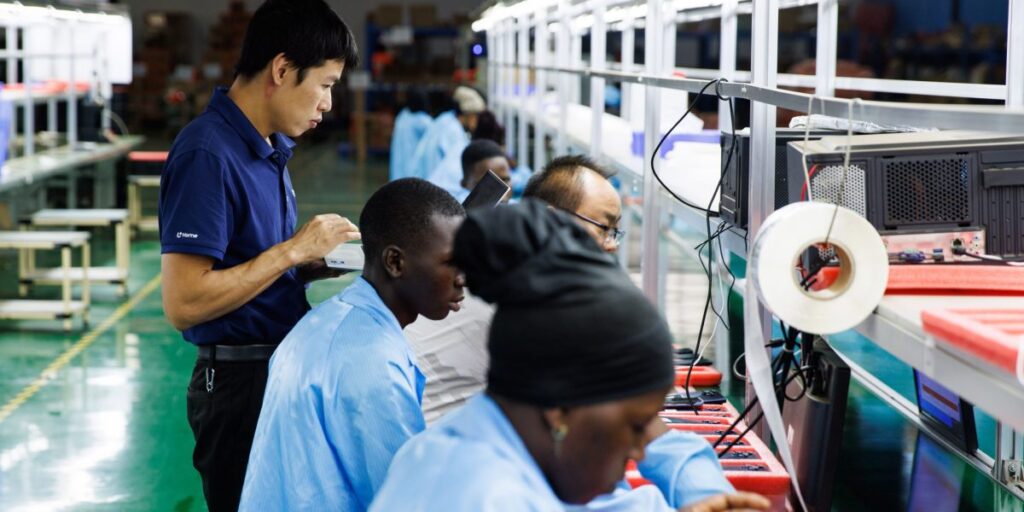
Anita Akpire was preparing fried rice in her kitchen in Ghana’s capital when her phone lit up with a barrage of restaurant order notifications. “I don’t think I can work without a phone in my line of work,” she said when requests came in for her signature dish, traditional fermented dumplings.
Internet-enabled phones have changed the lives of many people, but they could play a unique role in sub-Saharan Africa, where infrastructure and government services are among the least developed in the world, said Jenny Acker, a professor who studies the issue at Tufts University. At times, technology in Africa has bridged gaps, including providing access to mobile money to people without bank accounts.
Despite growing mobile internet coverage across a continent of 1.3 billion people, only 25% of adults in sub-Saharan Africa have access to it, according to Claire Sibthorpe, head of digital inclusion at UK mobile phone lobby group GSMA. Cost is the main barrier. According to Sibthorpe, the cheapest smartphone costs up to 95% of the monthly salary of the poorest 20% of the region’s population.
Literacy rates below the global average, as well as a lack of services in many African languages (about 2,000 languages are spoken throughout the continent, according to Harvard University’s African Languages Program) are other reasons why a smartphone isn’t an attractive investment for some.
“If you buy a car, it’s because you can drive it,” said Alain Capo-Chichi, chief executive of CERCO Group, a company that has developed a smartphone that works using voice commands and is available in 50 African languages, such as Yoruba, Swahili and Wolof.
Even in Ghana, where English is the lingua franca, knowing how to use smartphones and apps can be a challenge for newbies.
One new company in Ghana is trying to bridge the digital divide. Uniti Networks offers funding to make smartphones more affordable and trains users to navigate the app platform.
For Cyril Fianyo, a 64-year-old farmer in Ghana’s eastern Volta region, the phone has expanded his reach beyond calls and texts. Using his ID, he registered with Uniti, paid a deposit of 340 Ghana cedis ($25) for the smartphone and paid the remaining 910 cedis ($66) in installments.
He was shown how to use apps he was interested in, including a third-party farming app called Cocoa Link, which offers videos on planting techniques, weather information and detailed information about climate change issues that affected cocoa and other crops.
Fiagno, who used to sow by instinct and rarely interacted with agricultural consultants, was optimistic that the technology would increase his yield.
“I will know the exact landing time thanks to the weather forecast,” he said.
Kami Dar, chief executive of Uniti Networks, said mobile internet could help solve other problems, including access to health care. The company has launched in five communities across Ghana with 650 members and aims to reach 100,000 users within five years.
Scientist Acker noted that the potential impact of mobile phones in Africa is enormous, but said there was limited evidence that paid health or agriculture apps were benefiting people there. She argued that the only positive impact is a reminder to take medications or get vaccinated.
After studying agricultural apps and their impact, she said it doesn’t appear that farmers are getting higher prices or increasing their income.
CERCO Group’s Capo-Chichi said the lack of useful apps and content is another reason why more people in Africa are not buying smartphones.
Dar said Uniti Networks is learning from mistakes. A pilot project in northern Ghana to help cocoa farmers contribute to pensions attracted a lot of attention, but farmers did not find the app user-friendly and needed more training. Following the review, the pension provider changed the interface to improve navigation.
Others find benefits in the Uniti platform. Mawufemor Vitor, a church secretary in Hoho, said one health app has helped her track her periods to prevent pregnancy. And farmer Fiagno used the platform to search for information about herbal medicine.
But cellphones cannot replace investment in government services and infrastructure, Acker said.
She also raised concerns about the privacy of data in the hands of private technology providers and governments. With digital IDs in development in African countries such as Kenya and South Africa, this could pave the way for further abuse, Acker said.
Uniti Networks is a for-profit company that pays for each customer that subscribes to paid applications. Dar said it does not target vulnerable populations to sell them unnecessary services and said Uniti only offers apps that align with its message of impact, with a focus on healthcare, education, finance and agriculture.
Dar said Uniti had rejected lucrative offers from many companies, including gambling companies. “Technology can be used to do terrible things,” he said.
He acknowledged that Uniti tracks users on the platform to provide incentives in the form of free data and provide feedback to app developers. He acknowledged that users’ health and financial data could be at risk from external attacks, but said Uniti had decentralized its data storage in an attempt to reduce the risk.
However, the potential to provide solutions may outweigh the risks, Acker said, noting two areas where technology could make a difference: education and insurance.
She said mobile phones could help overcome illiteracy, which still affects 773 million people worldwide, according to UNESCO. Expanding access to insurance, which is still not widely used in parts of Africa, could provide protection for millions of people facing shocks on the front lines of climate change and conflict.
In Fiagno’s fields, his new smartphone sparked curiosity. “I’d like to be a part of it,” said neighboring farmer Godsway Quamiga.


